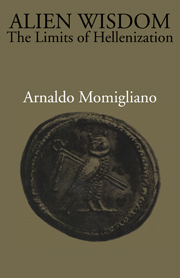Book contents
- Frontmatter
- Contents
- Per mia madre, presente sempre nel suo vigilc amore
- Preface
- 1 The Greeks and their neighbours in the Hellenistic world
- 2 Polybius and Posidonius
- 3 The Celts and the Greeks
- 4 The Hellenistic discovery of Judaism
- 5 Greeks, Jews and Romans from Antiochus III to Pompey
- 6 Iranians and Greeks
- Select Bibliography
- Index of Names
5 - Greeks, Jews and Romans from Antiochus III to Pompey
Published online by Cambridge University Press: 01 June 2011
- Frontmatter
- Contents
- Per mia madre, presente sempre nel suo vigilc amore
- Preface
- 1 The Greeks and their neighbours in the Hellenistic world
- 2 Polybius and Posidonius
- 3 The Celts and the Greeks
- 4 The Hellenistic discovery of Judaism
- 5 Greeks, Jews and Romans from Antiochus III to Pompey
- 6 Iranians and Greeks
- Select Bibliography
- Index of Names
Summary
‘It is unlawful for any foreigner to enter the enclosure of the temple which is forbidden to the Jews, except to those of them who are accustomed to enter after purifying themselves in accordance with the law of the country. Nor shall anyone bring into the city the flesh of horses or of mules or of wild or tame asses, or of leopards, foxes or hares or, in general, of any animals forbidden to the Jews.’ This is not a piece of the Mishnaic treatise Kelim: it is a decree of Antiochus III, King of Syria, enacted about 200 b.c. (Joseph. Antiq. Jud. 12.145–6), and its authenticity has been proved beyond any doubt by Elias Bickerman, the scholar who, more than any other, has taught us to understand Judaism in its Hellenistic surroundings (Syria 25 (1946–8), 67–85). Suddenly, after two centuries of obscurity and legends, two documents coming from the chancery of Antiochus III allow us to see something of the life of Jerusalem; the second document is again quoted by Flavius Josephus (Ant. Jud. 12.138–44), and was again defended against doubts of forgery by E. Bickerman, Rev. Étud. Juives 100 (1935), 4–35. What we see is a little temple-state, the economic and social structures of which had been shattered by the recent wars between Antiochus III and Ptolemy V. Palestine had passed from Egyptian to Syrian control.
- Type
- Chapter
- Information
- Alien WisdomThe Limits of Hellenization, pp. 97 - 122Publisher: Cambridge University PressPrint publication year: 1975
- 1
- Cited by



